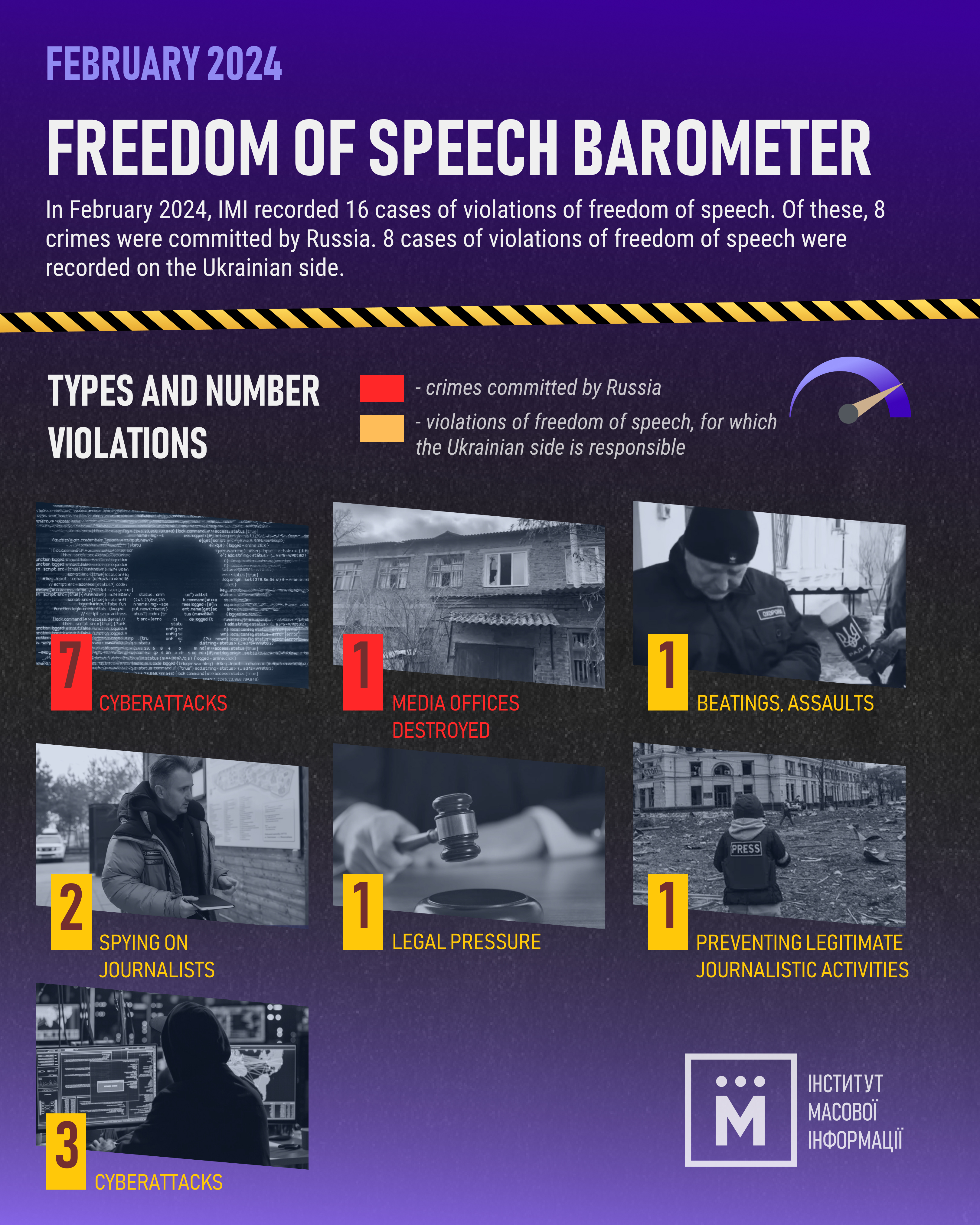In February 2024 IMI experts recorded 16 freedom of speech violations in Ukraine. This is evidenced by the monthly monitoring “Freedom of Speech Barometer” by the Institute of Mass Information.
Russia’s crimes (eight cases) include cyberattacks (7) and damage to a media office due to Russian shelling (1).
The Russian aggression in February resulted in the death of two more media workers who were defending Ukraine from occupation.
- Anton Yakovenko – soldier who worked as a video editor for the TV channel XSPORT before the start of Russia’s full-scale invasion. Anton Yakovenko had been fighting in the ranks of the SMB “Black Zaporozhians” No. 72 since the start of the full-scale invasion. His last battle happened in Vuhledar (Donetsk oblast).
- Volodymyr Petrenko – soldier and former “Polissya.today” editor (Zhytomyr oblast). He was killed by Russian mortar fire on February 22, 2024, near Synkivka (Kupyansk district, Kharkiv oblast).
Freedom of speech in February 2024
In February Russian hackers mass targeted the Ukrainian media. The latest cyber attacks were recorded on February 18 and 19 and affected at least five Ukrainian media outlets: “Telegraf”, “Apostrophe”, LIGA.net, Ukrainian Pravda’s X account and the TV channels “Espreso” і Priamyi. The Russians used the hacked resources to post disinformation about Russian troops “crushing” elite UAF units in Avdiivka.
The Russians also damaged the office of “Vorskla” newspaper when shelling Velyka Pysarivka (Sumy oblast). The newspaper’s team was unharmed. The Russians targeted the village center, civilian infrastructure, and residential buildings with Grad MRLS. Two shells fell near the “Vorskla” editorial office. All the windows in the room are broken, the roof is damaged. The interior of the office was damaged by debris.
The IMI also recorded eight freedom of speech violations committed by citizens of Ukraine. These include obstruction, surveillance and attacks on journalists, as well as cyber attacks and legal pressure.
The UAF operational unit “Sumy” has introduced permanent military escort for journalists in the “yellow zone” in their area. This contradicts the exceptions to the rules, which allow journalists to work on the yellow zone’s public sites which are freely accessible to civilians without an accompanying officer. The new edition of the Decree No. 73 stipulates that the responsibility for a journalist’s safety lies with the journalist and their media outlet, not with the military, which is why such escort seems excessive and burdensome to journalists.
Bihus.Info journalists recorded continued surveillance over them while working on a report about the SBU-sanctioned surveillance of their team. According to the journalist Alisa Yurchenko, they repeatedly noticed unknown men near their office and around the building. When asked what they were doing there, the men “could not provide a clear answer as to why they were wandering around the office in circles.”
Furthermore, the IMI recorded cyber attacks on investigators Heorhiy Shabayev (“Skhemy”) and Mykhailo Tkach (“Ukrainian Pravda”). Unknown persons attempted to access Shabayev’s Telegram channel and Tkach’s Facebook pages.
Shabayev believes this has to do with his reporting. According to him, someone wanted to access his Telegram account to learn about upcoming investigations by “Skhemy”, to get information on the media outlet’s sources, or both. He said that unknown persons managed to intercept the text message sent to his phone number. They entered the number correctly and almost accessed the chats, but the two-factor authentication installed by the journalist prevented it.
Learn more here.
The Institute of Mass Information (IMI) is a Ukrainian public media organization that has been operating since 1996. The IMI defends the rights of journalists, analyzes the media field and covers media-related events, fights propaganda and disinformation and has been providing media outlets with safety gear for trips to the combat zone since the start of the Russo–Ukrainian war in 2014.
The IMI carries out Ukraine’s only freedom of speech monitoring and keeps a list of high quality and sustainable online media outlets, documents Russia’s crimes against the media committed in the course of the war on Ukraine. The IMI has representatives in 20 oblasts of Ukraine and a network of “Mediabaza” hubs to provide journalists with continuous support. The IMI’s partners include Reporters Without Borders and Freedom House; the organization is a member of the International Organization for the Protection of Freedom of Expression (IFEX).

